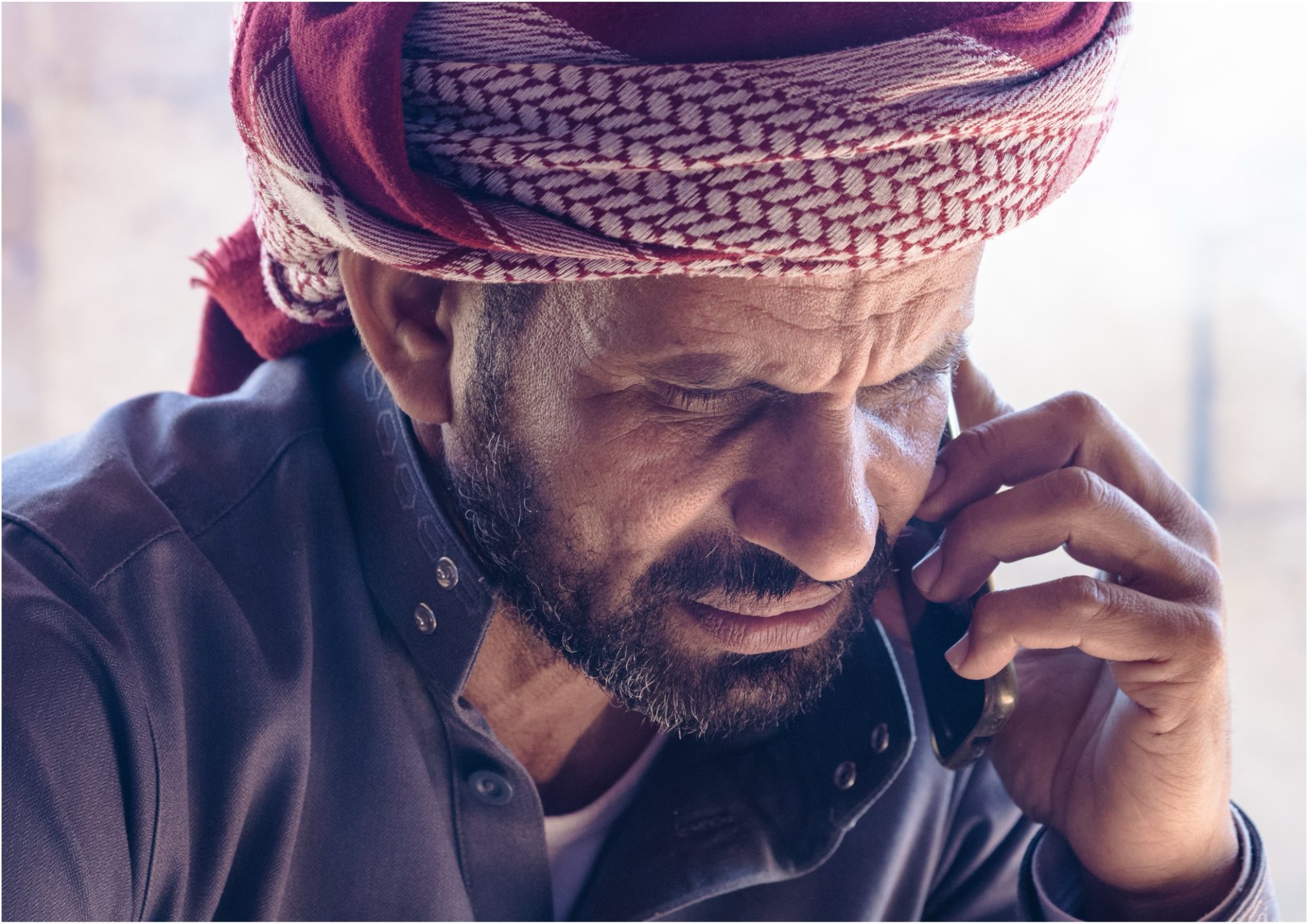In recent years, Egypt has witnessed a significant rise in smartphone penetration, with an estimated 97.3% of its citizens now owning a smartphone, and a further 72.2% having access to the internet. As such, the northeast African nation has come a long way over the past few decades, with only 1.98% of its population having been subscribed to mobile phone services in 2000. Now, in 2024, smartphones are very much an integral part of daily life for millions of Egyptians.
This technological shift is not just changing how people communicate or access information — it’s also transforming the very nature of essential services across the country, particularly in the healthcare sector.
The Egyptian government acknowledges this potential and has partnered with tech giant Vodafone, the country’s largest mobile network operator, to initiate an ambitious plan for using smartphones to expand access to medical services.
The Egyptian Government’s Digital Health Initiative
Vodafone Egypt has become a key player in Egypt’s digital health transformation and acts as the primary technology partner for the government’s comprehensive health insurance project.
This partnership extends Vodafone’s established presence in Egypt, which began in 1998 when the company started operating as part of the Click GSM consortium. In 2002, the company rebranded as Vodafone Egypt and has grown to serve more than 44 million customers across the country.
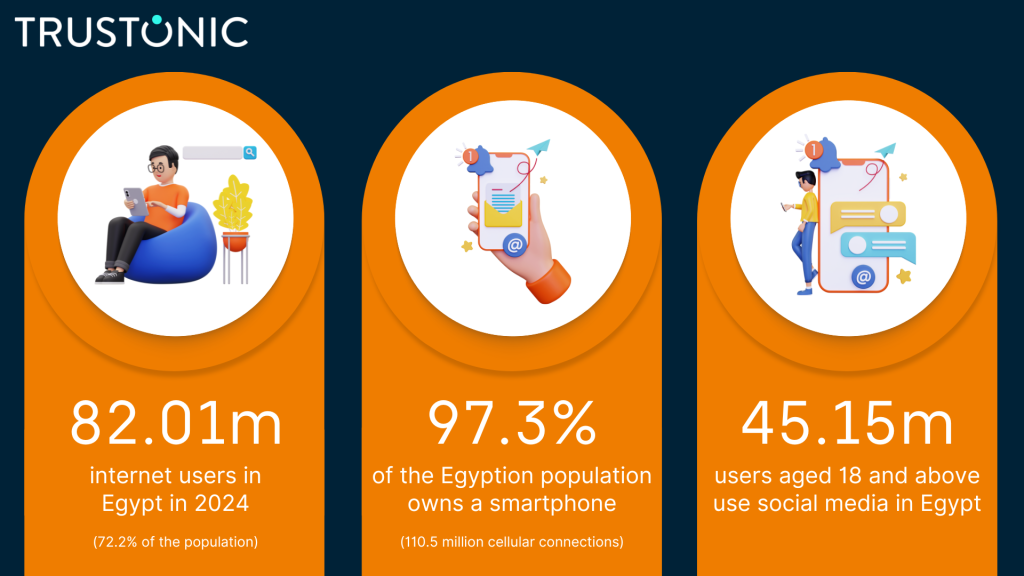
Now in its fourth year, the partnership between the government and Vodafone is focused on automating and digitalizing Egypt’s comprehensive health insurance system, and includes several ambitious projects.
1) Egypt’s First Fully Digital Hospital: Suez Medical Complex
The Suez Medical Complex is a key part of Egypt’s digital health revolution and is important for achieving universal health coverage in line with Egypt’s Vision 2030.
The complex is part of a larger network of health facilities in the Suez Governorate, including six hospitals and 27 family medicine centers and units. This network, representing an investment of over three billion Egyptian pounds ($96 million), serves more than half a million citizens registered in the Universal Health Insurance system in Suez.
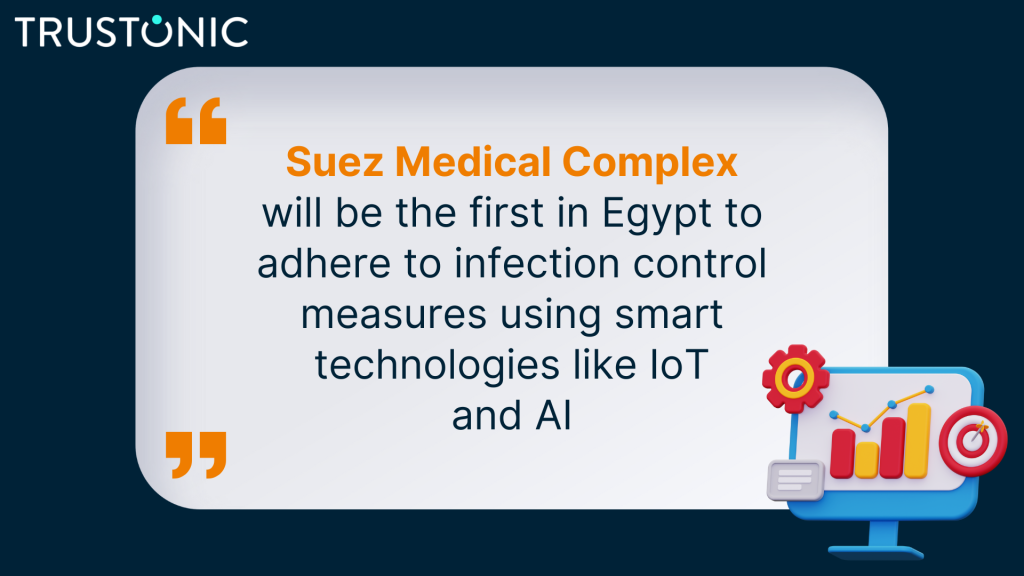
Egyptian officials expect this state-of-the-art facility will significantly improve healthcare services for the people of Suez and the Canal Region, showing the potential of the government-Vodafone partnership in changing healthcare delivery.
2) Nationwide Telemedicine Network
Egypt has made notable progress in telemedicine, bringing quality healthcare to remote and underserved areas. This initiative, born from collaboration between the government, telecom companies – including Vodafone – and technology partners, is improving healthcare delivery across the nation.
The country’s telemedicine market, valued at $170 million in 2022, is projected to reach $717 million by 2030, growing at a compound annual growth rate (CAGR) of 19.7%:
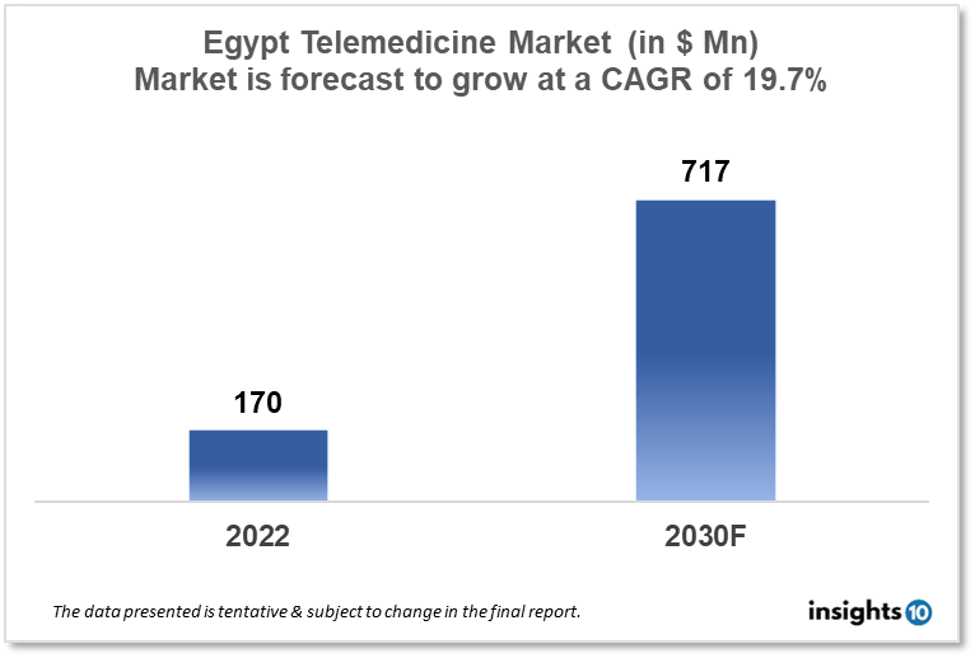
This growth is supported by government initiatives that align with Egypt’s Vision 2030 and the national strategy to leverage ICT for sustainable development. The Egyptian government has significantly increased its healthcare investment, allocating $1.26 billion for FY 2022–2023, a 30% increase from the previous year.
A good example of telemedicine in action is the “One Million Free Consultations Initiative,” launched in 2020 as a collaboration between Telecom Egypt, Altibbi (a digital health platform), and the United Nations Development Programme (UNDP), to provide one million free remote medical consultations to Egyptian citizens.
By using digital technologies, including online platforms, voice calls, and text messages, the initiative has successfully conducted over 750,000 digital consultations as of 2021, with a quarter of these related to COVID-19.
The project has not only reduced the cost of medical consultations, but also promoted social distancing during the pandemic and alleviated pressure on hospitals and clinics. While available nationwide, the initiative has a particular focus on residents of Upper Egypt, who often face challenges in accessing quality healthcare.
3) Advancing Medical Tourism in Egypt
The Egyptian government and Vodafone’s partnership also aims to change medical tourism in Egypt and create an experience that combines top-tier healthcare with the country’s rich cultural and historical offerings.
This initiative uses Egypt’s unique position as both a medical hub and a tourist destination, offering patients a journey of recovery that is both effective and enjoyable.
Egypt’s medical tourism market is growing significantly. Valued at approximately $14.8 billion in 2022, it’s projected to reach $154.3 billion by 2030, with a CAGR of 34%.
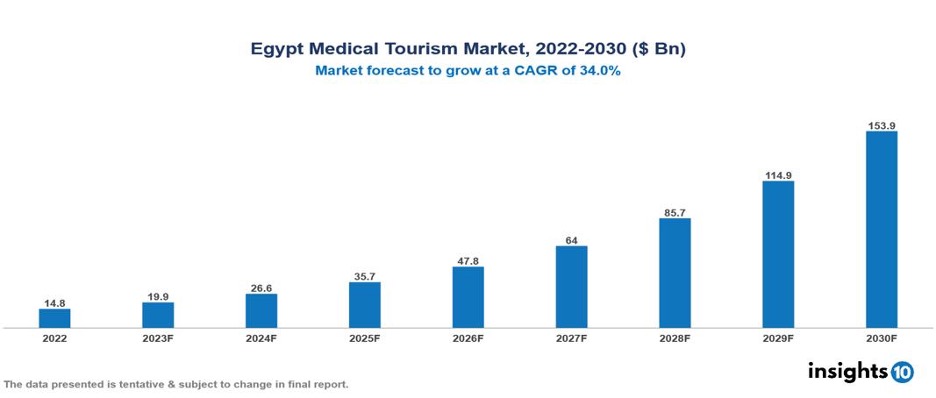
Globally, about 14 million people travel annually for medical treatment. Popular services include cosmetic surgery, dental treatment, and various surgical procedures.
Egypt’s market growth is supported by increasing investments in healthcare technologies and medical facilities. Its competitive advantages include lower treatment costs, skilled healthcare professionals, improved quality of care, and advanced technology.
As the country positions itself in this growing market, it faces competition from established medical tourism destinations like Turkey, India, and Thailand, as well as regulatory hurdles, concerns about patient safety and quality of care, and the need to enhance its global reputation in healthcare. Success, therefore, will depend on addressing challenges while capitalizing on strengths in both healthcare and tourism.
To accomplish these goals, Vodafone is driving two major national initiatives: the Universal Health Insurance (UHI) program, marking significant health insurance reform across six governorates, and the digitalization of Egyptian University Hospitals in 12 universities nationwide.
Central to the operator’s healthcare strategy is a comprehensive ecosystem of digital tools, including:
- Hospital Information Systems (HIS)
- Payer Systems for easy claims and payments
- Patient Engagement Solutions that connect patients with healthcare providers
- Enterprise Resource Planning (ERP) systems for healthcare management
- Hospital Accreditation Modules for staff and inspectors
Furthermore, Vodafone is expanding its offerings to include cloud services and inclusive payment solutions like Vodafone Cash, further integrating smartphones into the healthcare ecosystem. Vodafone Cash is a financial services platform built on M-PESA technology, which provides around three million customers with peer-to-peer money transfers, payments, savings products, and access to micro-loans.
The service is particularly significant in Egypt, where around 30% of the population is unbanked as of 2023, positioning Vodafone as a key driver of financial inclusion. As such, by expanding its services to include Vodafone Cash, the operators is not only enabling patients to manage appointments and access medical records from their smartphone, but also to make payments from it.
Security Challenges and Access Considerations
While Egypt’s digital health revolution promises to improve healthcare access and quality, it also brings challenges that need to be addressed.
As with any technological shift, the integration of smartphones and digital platforms into healthcare delivery presents both opportunities and potential pitfalls. Two critical areas of concern are data security and privacy and the digital divide and accessibility.
1) Data Security and Privacy
As Egypt rapidly digitizes its healthcare system, data security and privacy have become critical concerns. The country’s Data Protection Law No. 151/2020 sets guidelines for handling personal data, but implementation in the healthcare sector presents unique challenges.
A notable incident in August 2023 underscored this challenge when Minister of Health and Population Khaled Abdel-Ghaffar addressed a major data breach. The leak involved sensitive information of two million Egyptian patients, including names, national ID numbers, and medical details related to a presidential healthcare initiative.
The Ministry of Health and Population has stated that it will take all necessary measures to protect patient privacy, but, this incident demonstrates that even government-run health initiatives are not immune to data breaches.
Vodafone also isn’t immune. In March 2024, Vodafone Egypt experienced a significant network outage, primarily affecting its 4G services, with Cloudflare Radar reporting a major internet disruption as a result, with Vodafone Egypt’s traffic dropping by up to 70%:
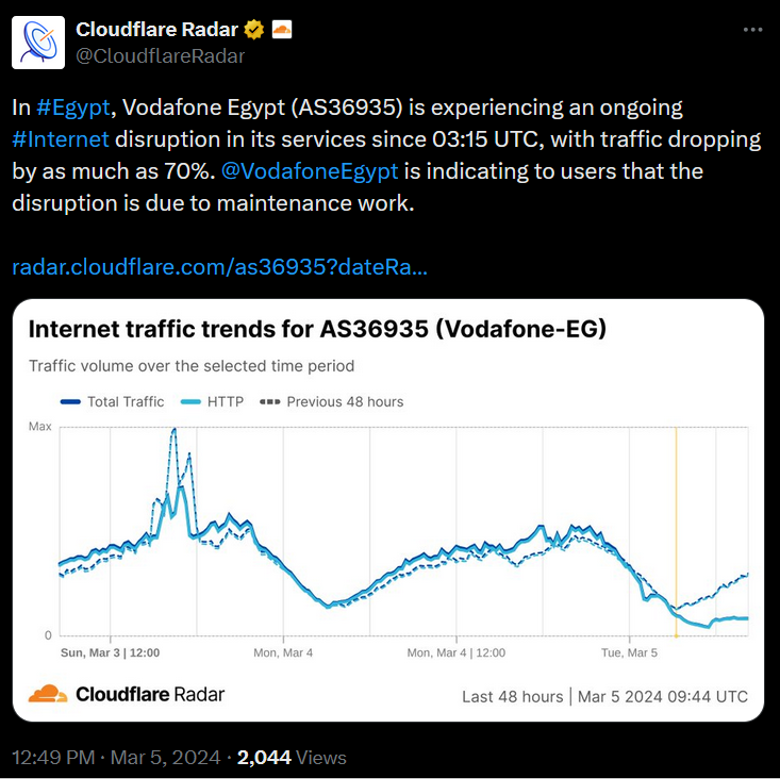
2) Digital Divide and Accessibility
Despite Egypt’s high smartphone penetration rate, a significant digital divide persists, particularly in rural areas and among lower-income groups. This divide threatens to create a two-tiered healthcare system where digital health benefits are not equally distributed.
In Upper Egypt, where internet connectivity is less reliable, telemedicine initiatives have faced challenges. The government’s Haya Karima (Decent Life) initiative aims to address this by improving digital infrastructure in rural areas, but progress has been slow.
Language barriers also contribute to the digital divide. Most health apps and online resources are available only in Arabic and English, potentially excluding Egypt’s Nubian and Berber-speaking minorities.
To address these issues, Egypt can look to Jordan’s successful “Internet for All” initiative from 2017, which focused on providing affordable internet access and digital literacy training in underserved areas. Tunisia’s mobile health vans, equipped with telemedicine capabilities, offer another model for bridging the urban-rural healthcare gap.
The challenge lies in balancing rapid digital health advancements with efforts to ensure these benefits reach all segments of the population. As Egypt continues its digital health transformation, addressing these challenges will be important for achieving equitable and universal health coverage.
Egypt’s digital health revolution is within its grasp
Egypt’s shift towards digital healthcare, spearheaded by its partnership with Vodafone, marks a major step in improving access, quality, and efficiency nationwide. This integration of smartphones and digital technologies represents a big change in healthcare delivery.
Using high smartphone penetration and Vodafone’s technological expertise, Egypt is addressing longstanding healthcare challenges through telemedicine and health apps. The country’s innovative public-private collaboration serves as a model for other developing nations.
However, Egypt and Vodafone must address challenges like the digital divide, data security, and maintaining personal care. Refining regulations and investing in digital infrastructure are key to realizing the full potential of smartphone-enabled healthcare. As a leading supplier of smartphone locking technology for the global smartphone industry, we at Trustonic stand ready to work with OEMs operating in Egypt to strengthen device security and secure the nation’s digital health revolution.
As Egypt’s digital health ecosystem evolves, it promises to achieve significant healthcare goals and improve outcomes. The smartphone, powered by Vodafone’s network and solutions, has transformed from a communication device into a powerful tool in Egypt’s journey towards universal health coverage and improved public health.
For more about why smartphones are crucial for growth in Egypt and across the rest of Africa, please read the blog post here – How Access to Smartphones is Transforming Lives and Economies in Africa.
